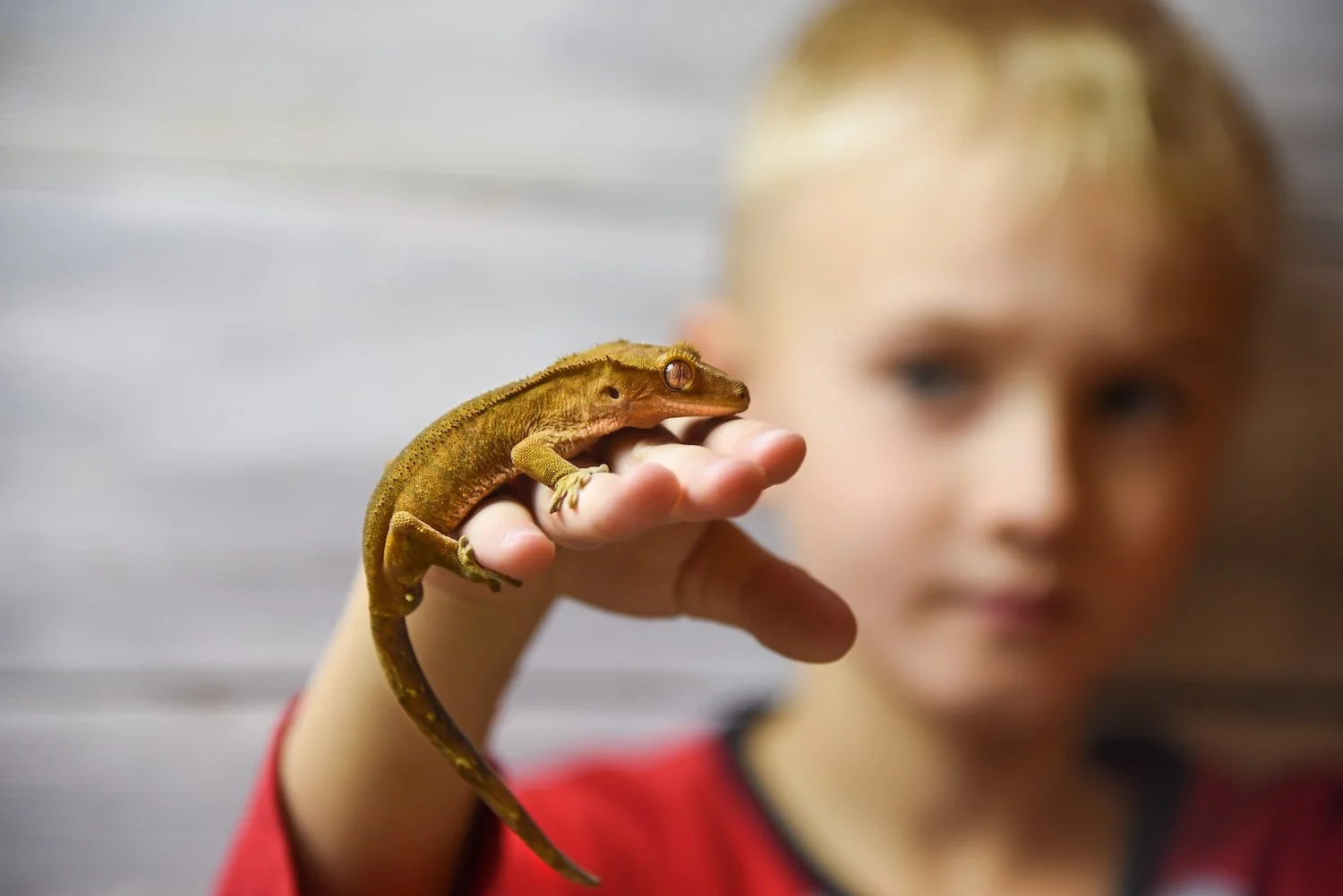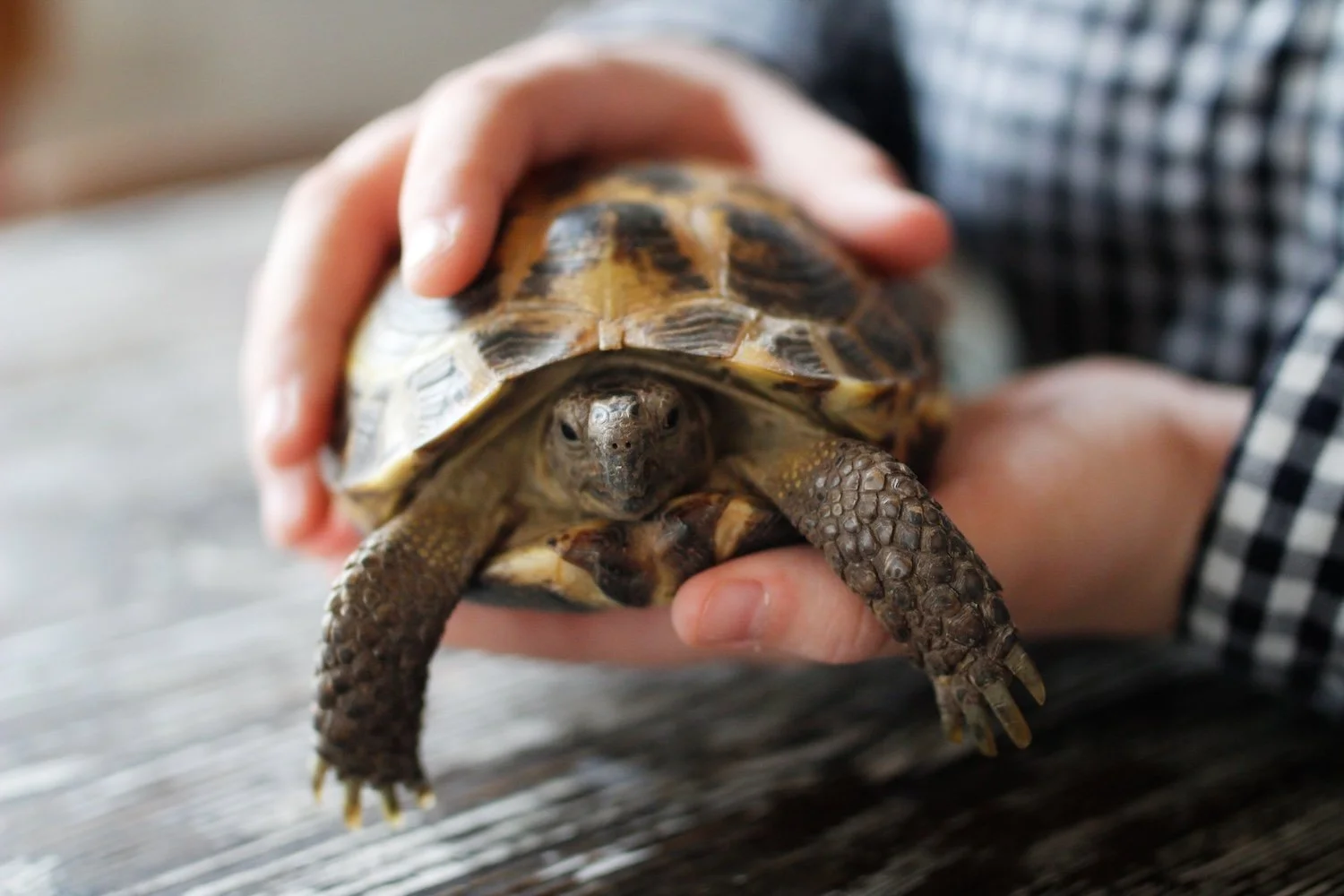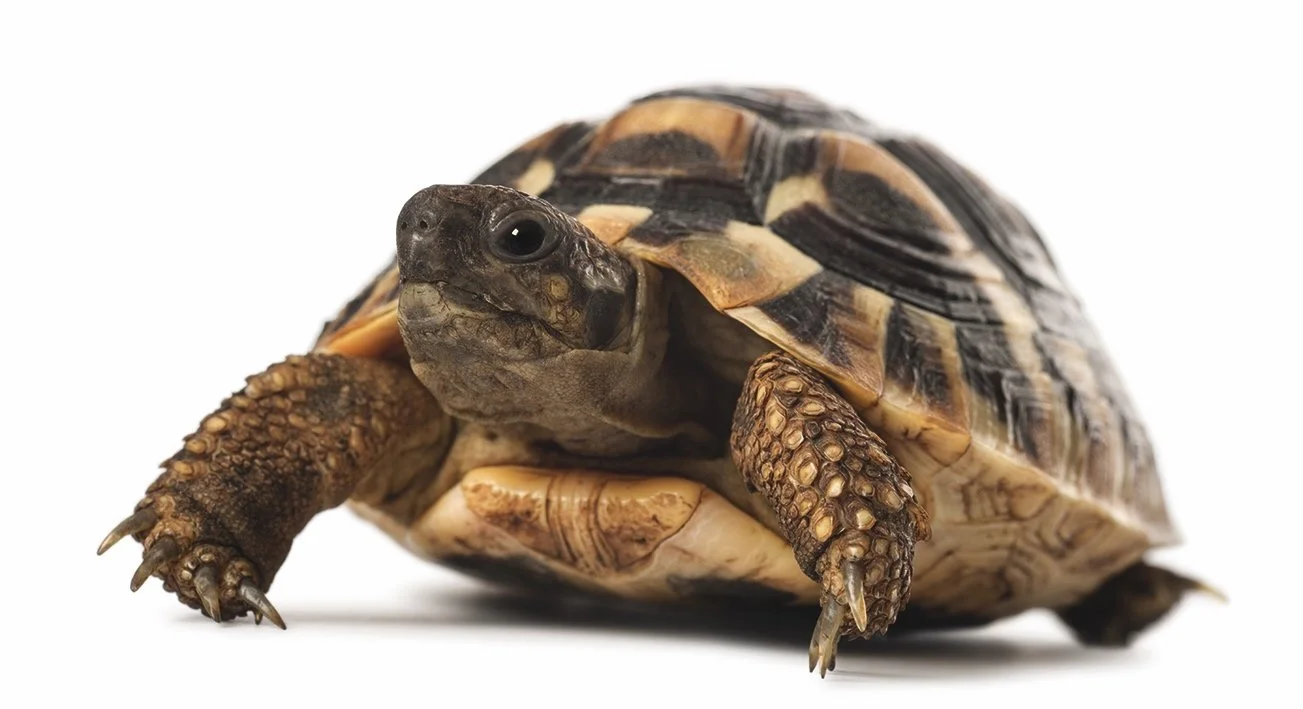6
ways
reptiles
BOOST
your mental
wellbeing
can
Reptile keeping and mental health
As research continues to explore the links between human–animal interaction, reptiles are emerging as an unexpectedly vital presence in people’s lives. So what is it about these understated companions that supports mindfulness, reduces stress, and strengthens social ties? The answers lie in the subtle ways reptiles interact with their keepers.
Summary (TL;DR)
Reptiles can support mental wellbeing in several ways. They encourage mindfulness and calm, provide low-stress companionship, help reduce feelings of loneliness, fit easily into home routines, offer gentle structure and responsibility, and provide engaging, soothing interaction that can enhance emotional health. Caring for reptiles can be a simple yet effective way to boost mood and wellbeing.
Encouraging mindfulness
There’s something surprisingly soothing about watching a reptile moving around its enclosure, simply going about its day. Whether it is a gecko navigating a branch, a bearded dragon chasing a locust, or a snake coiled on a basking spot; taking a few minutes to observe these behaviours can focus the mind and ease intrusive thoughts. Simply observing reptile behaviour is an escape from the complexities and stresses of our busy lives.
1
2
Low-stress pets
Reptiles offer a type of companionship suited to calm, independent lifestyles. Most popular species are relatively low-maintenance, quiet, and entirely content in their own company. They do not fret when you leave the house or demand attention or human contact. For anyone who values the presence of a pet without the pressures of frequent handling or daily walks, reptiles offer a compelling option. Owning a reptile is often unexpectedly comforting, which is why they are an attractive pet for so many people.
Combating loneliness
For many, reptiles provide an invaluable sense of connection which can ease feelings of isolation. The reptile community is a major part of many keepers’ lives, offering a rare and valuable connection with others who are passionate about the same niche topic. As Nigel Robert explains in his article Four Ways Reptiles Can Improve Your Mental Health, ‘Keeping a reptile can provide a gateway for human connection through reptile expos, online forums, and hobby groups’, mirroring broader findings summarised in a research study by McNicholas et al. ‘Pets undoubtedly act as “social catalysts,” leading to greater social contact between people … particularly important for those at risk of social isolation’ (McNicholas et al., BMJ, 2005). It’s no wonder pets are such a vital part of many people’s lives, and reptile pets fit the bill perfectly.
3
4
Ideal for homebodies
For people who spend most of their time at home, whether by choice, limited mobility, anxiety or agoraphobia, reptiles can be a reassuring and practical companion. They need little or no outdoor exercise, make very little noise, and thrive in a stable indoor environment. As Nigel Robert explains, ‘Whether because of physical limitations or mental health conditions like anxiety or agoraphobia, some people struggle or are unable to leave their houses regularly or at all. Reptiles may be the perfect pet for them… With assistance for those rare [vet] visits, a housebound person can easily keep a happy, healthy reptile in their home’ (Nigel Robert, Four Ways Reptiles Can Improve Your Mental Health).
Structure and routine
As is true with all pets, reptile care relies on consistency, and their keepers often benefit from it too. Feeding, misting, and regular cleaning routines provide a purpose and structure that supports emotional stability. As Azevedo et al. observed in Understanding the Human–Reptile Bond, ‘Four main categories of motivations for the long‑term keeping of pet reptiles were identified: convenience, entertainment, companionship, and duty of care’ (Azevedo, Guimarães, Ferraz, Whiting & Magalhães‑Sant’Ana, 2022, p. 757). This sense of duty, combined with predictable daily care, helps keepers establish a rhythm to their day. Nigel Robert similarly notes that routine tasks, such as feeding and enclosure maintenance, can support people managing depression and rebuilding independence. For many, these consistent actions are calming, grounding, and offer a compelling sense of accomplishment.
5
6
Your perfect pet?
There’s plenty of research that demonstrates measurable associations between pet ownership and health. Headey reported that ‘dog and cat owners make fewer annual doctor visits and are less likely to be on medication for heart problems and sleeping difficulties’ (Headey, Health Benefits and Health Cost Savings Due to Pets, 1999). It’s likely that caring for reptiles offers similar paybacks. Azevedo et al. emphasises that ‘Results suggest that human–reptile relations are driven by the same feelings as those previously reported for mammalian pets, although they are more diverse and nuanced by a sense of admiration and fascination for their mysterious nature and unusual behaviors’ (Azevedo, Guimarães, Ferraz, Whiting & Magalhães‑Sant’Ana, 2022, p. 767).
Reptiles may not express affection in the same ways as a dog or cat might, but most keepers will tell you that their animals are interactive and affectionate in their own equally rewarding ways.
For those seeking a pet that brings calm rather than chaos, reptiles can be a steady and grounding presence. Their quiet nature encourages patience and reflection, offering moments of focus that support healthier, more balanced days. And that’s something we could all benefit from.
For more information about the benefits of reptile keeping, see:
Understanding the Human–Reptile Bond: An Exploratory Mixed-Methods Study.
Azevedo, A., Guimarães, L., Ferraz, J., Whiting, M., & Magalhães-Sant’Ana, M. (2022). Anthrozoös, 35(6), 755–772.
Four Ways Reptiles Can Improve Your Mental Health.
Nigel Robert, The CDIA
Pet ownership and human health: a brief review of evidence and issues.
McNicholas J., Gilbey A., Rennie A., Ahmedzai S., Dono J.-A. & Ormerod E. (2005) British Medical Journal, 331(7527), 1252-1254.
Health Benefits and Health Cost Savings Due to Pets: Preliminary Estimates from an Australian National Survey
Headey B. (1999) Social Indicators Research, 47, 233-243.
An Examination of the Potential Role of Pet Ownership, Human Social Support and Pet Attachment in the Psychological Health of Individuals Living Alone.
Antonacopoulos, N. M. D., & Pychyl, T. A. (2010). Anthrozoös, 23(1), 37-54.
The Effects of Animals on Human Health and Well-Being.
Wells, D. L. (2009). Journal of Social Issues, 65(3), 523-543
Human Health Benefits of Non-Conventional Companion Animals: A Narrative Review.
Macauley, L., & Chur-Hansen, A. (2023). Animals, 13(1), 28.
Positive behavioral impact of reptile-assisted support on the internalizing and externalizing behaviors of female children with emotional disturbance.
Murry, F. R., & Allen, M. (2012). Anthrozoös, 25(4), 415–425.
Benefits of pets’ ownership, a review based on health perspectives.
Hussein, S. M., Soliman, W. S., & Khalifa, A. A. (2021). Journal of Internal Medicine and Emergency Research, 2(1), 1–9.
Social behaviours increase in children with autism in the presence of animals compared to toys.
O’Haire, M. E., McKenzie, S. J., Beck, A. M., & Slaughter, V. (2013). PLOS ONE, 8(2), e57010.
Cognitive mechanisms and neurological foundations of companion animals’ role in enhancing human psychological well-being.
Liu, H., Lin, J., & Lin, W. (2024). Frontiers in Psychology, 15, 1354220.
The Health Care Cost Savings of Pet Ownership.
Human Animal Bond Research Institute (2015).
To enjoy more articles like this and receive our free digital magazine.
Join RRK today








